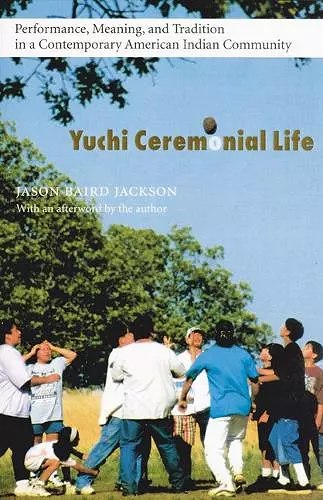Yuchi Ceremonial Life
Performance, Meaning, and Tradition in a Contemporary American Indian Community
Format:Paperback
Publisher:University of Nebraska Press
Published:1st Nov '05
Currently unavailable, and unfortunately no date known when it will be back

A study of a little-known southeastern Native group
The Yuchis are one of the least known yet most distinctive of the Native groups in the American southeast. The famous naturalist William Bartram visited a Yuchi town in 1775, at a time when the Yuchis had moved near and become allied with Creek communities in Georgia. This title examines the significance of community ceremonies for the Yuchis.The Yuchis are one of the least known yet most distinctive of the Native groups in the American southeast. Located in late prehistoric times in eastern Tennessee, they played an important historical role at various times during the last five centuries and in many ways served as a bridge between their southeastern neighbors and Native communities in the northeast. First noted by the de Soto expedition in the sixteenth century, the Yuchis moved several times and made many alliances over the next few centuries. The famous naturalist William Bartram visited a Yuchi town in 1775, at a time when the Yuchis had moved near and become allied with Creek communities in Georgia. This alliance had long-lasting repercussions: when the United States government forced most southeastern groups to move to Oklahoma in the early nineteenth century, the Yuchis were classified as Creeks and placed under the jurisdiction of the Creek Nation. Today, despite the existence of a separate language and their distinct history, culture, and religious traditions, the Yuchis are not recognized as a sovereign people by the Creek Nation or the United States. Jason Baird Jackson examines the significance of community ceremonies for the Yuchis today. For many Yuchis, traditional rituals remain important to their identity, and they feel an obligation to perform and renew them each year at one of three ceremonial grounds, called “Big Houses.” The Big House acts as a periodic gathering place for the Yuchis, their Creator, and their ancestors. Drawing on a decade of collaborative study with tribal elders and using insights gained from ethnopoetics, Jackson captures in vivid detail the performance, impact, and motivations behind such rituals as the Stomp Dance, the Green Corn Ceremony, and the Soup Dance and discusses their continuing importance to the community.
"[Jackson's] considerable sensitivity to his cultural consultants and winsome writing style make this book a standout among ethnological works... This book makes a valuable contribution to literature about tribes originating in the southeastern US, and is even more valuable as a model of commitment to the ethical exploration and documentation of intimate ceremonial identity."-Choice Choice "Useful as a primer on the Yuchi. I am certain students and researchers alike will benefit from consulting this book."-Joe Watkins, Journal of Anthropological Research -- Joe Watkins Journal of Anthropological Research "Yuchi Ceremonial Life is first-rate ethnography... Its analysis of ceremonial life allows the Yuchi people to emerge as a distinct and vibrant community, an importance that has historical and political ramifications... It will undoubtedly contribute to the ongoing attempt by Yuchis themselves to create a written record of their lives."-Andrew K. Frank, Indigenous Nations Studies Journal -- Andrew K. Frank Indigenous Nations Studies Journal "One may now consider the outstanding scholarship of Jason Baird Jackson in Yuchi Ceremonial Life. His research and interaction with surviving Yuchis, in Oklahoma, has revealed them and their unique culture, finally, to all-thus ripping the veil that has hidden them... To read Yuchi Ceremonial Life is to discover how little one knows about life, the past, and thousands of faceless peoples who were here in advance of the Euro-Americans. In short, this is a wonderful, perceptive study for those with interests in native history, ethnography, anthropology, and Americana."-The Chronicles of Oklahoma The Chronicles of Oklahoma The writing is pleasantly fluent. The author includes many texts of oratory and commentary. The illustrations, maps and tables are useful as are the two brief appendixes. The encouraging implicit message of this book is that extensive cultural change does not necessarily entail the extinction of ethnographic interest."-R. H. Barnes, Anthropos -- R. H. Barnes Anthropos
ISBN: 9780803276284
Dimensions: unknown
Weight: 499g
350 pages